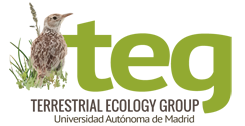
Universidad Autónoma de Madrid
Departamento de Ecología. C-216
Centro de Investigación en Biodiversidad y Cambio Global (CIBC-UAM)
28049 – Madrid (España)
Tfn: +34 91 497 8916
Fax: +34 91 497 8001
E-mail: pablo.acebes(at)uam.es
Algunas publicaciones recientes
Oñate, J.J., Acebes, P., & Olea, P. P. (2023). Aprender del pasado para afrontar el futuro. Desafíos ambientales de la agricultura española en el siglo XXI: una mirada desde el legado de Fernando González Bernáldez. Ecosistemas 32 (Especial), 2495. https://doi.org/10.7818/ECOS.2495
Pérez, C., Acebes, P., Franco, L., Llusia, D. & Morales, M. B. (2023). Olive grove intensification negatively affects wintering bird communities in Central Spain. Basic and Applied Ecology, 70: 27-37. https://doi.org/10.1016/j.baae.2023.04.005
Planillo, A., Viñuela, J., Malo, J. E., García, J. T., Acebes, P., Santamaría, A. E., Domínguez, J.C. & Olea, P. P. (2023). Addressing phase of population cycle and spatial scale is key to understand vole abundance in crop field margins: Implications for managing a cyclic pest species. Agriculture, Ecosystems & Environment, 345: 108306. https://doi.org/10.1016/j.agee.2022.108306
González, B. A., Acebes, P., Corti, P., Grimberg, M., Iranzo, E., Malo, J. E., … & Franklin, W. L. (2022). Historical Perspective and Current Understanding of the Ecology, Conservation, and Management of the Guanaco in the Chilean Patagonia. In Guanacos and People in Patagonia (pp. 191-232). Springer, Cham. https://link.springer.com/chapter/10.1007/978-3-031-06656-6_8
Acebes, P., Vargas, S. & Castillo, H. (2022). Sarcoptic mange outbreaks in vicuñas (Cetartiodactyla: Camelidae): a scoping review and future prospects. Transboundary and Emerging Diseases, 69(5): e1201-e1212. https://doi.org/10.1111/tbed.14479
Acebes, P., Alba-Iglesias, Z. & Muñoz-Galvez, F. (2021). Do Traditional Livestock Systems Fit into Contemporary Landscapes? Integrating Social Perceptions and Values on Landscape Change. Agriculture, 11(11): 1107. https://doi.org/10.3390/agriculture11111107
Grace, M.K., Akçakaya, R., Bennett, E.L.,…Acebes, P.,…& Young, S. (20/204). (2021). Testing a global standard for quantifying species recovery and assessing conservation impact. Conservation Biology, 35 (6): 1833-1849. https://doi.org/10.
Pozo, R.A, Cusack, J.J., Acebes, P., Malo, J.E., Traba, J., Iranzo, E.C., Morris-Trainor, Z., Minderman, J., Bunnefeld, N., Radic, S., Moraga, C., Arriagada, R. & Corti, P. (2021). Reconciling livestock production and wild herbivore conservation: challenges and opportunities. Trends in Ecology & Evolution, 36: 750-761. https://doi.org/10.1016/j.tree.2021.05.002
Acebes, P., Lillo, P. & Jaime-González, C. (2021). Disentangling LiDAR Contribution in Modelling Species–Habitat Structure Relationships in Terrestrial Ecosystems Worldwide. A Systematic Review and Future Directions. Remote Sensing, 13(17): 3447. https://doi.org/10.3390/rs13173447
Acebes, P. & Gonzalez, B. (2021). Vicugna vicugna (Green Status assessment). The IUCN Red List of Threatened Species 2021: e.T22956A2295620213. Accessed on 16 December 2021. https://www.iucnredlist.org/species/22956/145360542#green-assessment-information
Mezquida, E.T., Caputo, P., & Acebes, P. (2021). Acorn Crop, Seed Size and Chemical Defenses Determine the Performance of Specialized Insect Predators and Reproductive Output in a Mediterranean Oak. Insects, 12(8): 721. https://doi.org/10.3390/insects12080721
Acebes, P. & Grace, M. (2021). Beyond the Red List of Threatened Species: The IUCN Green Status of Species as a tool to assess their conservation success. First data for South American Wild Camelids. IUCN SSC GECS News, 8: 4-11.
Iranzo, E.C., Traba, J., Mata, C., Acebes, P. & Malo, J.E. (2021). Habitat structure and association with ungulates drive habitat selection and grouping behaviour of lesser rhea (Rhea pennata subsp. pennata). Austral Ecology, 46: 86-97. https://doi.org/10.1111/aec.12961
Ortega-Ramos, P.A., Mezquida, E.T. & Acebes, P. (2020). Ants indirectly reduce the reproductive performance of a leafless shrub by benefiting aphids through predator deterrence. Plant Ecology, 221: 91-101. https://doi.org/10.1007/s11258-019-00995-0
Acebes, P. (2019). Integration of wild pollinator conservation into the Common Agricultural Policy 2014-2020. Study case: Spain. Institute for European Environmental Policy (IEEP) – International Union for Conservation of Nature (IUCN).
Iranzo, E.C., Wittmer, H., Traba, J., Acebes, P., Mata, C. & Malo, J.E. (2018). Predator occurrence and perceived predation risk determine grouping behavior in guanaco (Lama guanicoe). Ethology, 124: 281-289. https://doi.org/10.1111/eth.12727
Iranzo, E., Acebes, P., Estades, C.F., González, B.A., Mata, C., Malo, J.E. & Traba, J. (2018). Diffusive dispersal in a growing ungulate population: guanaco expansion beyond the limits of protected areas. Mammal Research, 63: 185-196. https://doi.org/10.1007/s13364-017-0345-x
MAGRAMA. (2016). Informe Nacional sobre el Estado de la Biodiversidad para la Alimentación y la Agricultura. Ministerio de Agricultura, Alimentación y Medio Ambiente. Secretaría General Técnica. Centro de Publicaciones. 324 pp. Acebes, P. & Oñate, J.J. redactores en calidad de asistencia técnica. NIPO: 280-16-324-8.https://servicio.magrama.gob.es/tienda/jsp/ConsultaIndividual.jsp?codigo=109812#
Puedes ver una lista más completa en:
ResearchGate: http://www.researchgate.net/profile/Pablo_Acebes/
Google Académico: http://scholar.google.com/citations?user=YdNVnF4AAAAJ&hl=es

